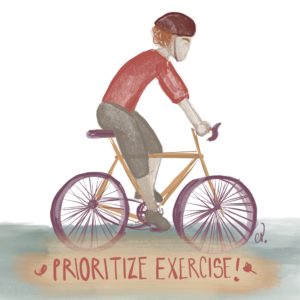
Cognitive Decline. Memory Loss. Alzheimer’s Disease. Dementia. These words strike fear in the hearts of everyone. None of us want to lose our memory or cognitive function. None of us want to feel like our brains are betraying us. Even mild, normal forgetfulness can be frustrating and exhausting.
As any cursory google search will tell you, scientific research has yet to uncover a cure for neurological diseases like Alzheimer’s Disease. However, the last hundred years of research has made tremendous inroads for our knowledge of the brain. In fact, we now know that the brain has a remarkable degree of plasticity and a shocking capacity for regeneration. Neurogenesis is a term that refers to the growth of new neurons. In layman’s terms, this means that your brain, with its capacity to learn and remember, is not a static thing. You can improve your capacity to think, reflect, and analyse. You can improve your brain and protect against cognitive decline.
1. Exercise 
It is well known that exercise is a game changer for cognitive health. In fact, research has shown that exercise increases blood flow to the brain and is linked to increased brain tissue growth, a reduction in cellular deterioration, an increase in cellular regeneration, and improvement in memory. Plus, students who exercised regularly perform better academically. Exercise has cognitive benefits for all ages, from the very young to the very old, including those affected by neurological diseases like Alzheimer’s disease. No matter the current state of your cognitive health, regular exercise will help you improve it.
There are many ways to include exercise into your daily life. Start with something simple, like walking every morning, or biking around your neighborhood. You don’t have to be a bodybuilder or CrossFit aficionado to have a healthy exercise life. Emphasise movement in your day, stretch regularly to keep muscles limber, and get your heart rate up through exercise that you enjoy.
2. Learn Something New 
Musculoskeletal exercise is vital but it isn’t the only way to improve cognitive health. Regular brain exercise through learning something new is a crucial part of maintaining the connections already established between neurons, and building new ones. As hinted at in the previous section, new brain cell growth can occur at any point in time, and the act of learning or experiencing something new triggers the formation of new connections and memories, greatly improving both working and long term memory.
There are many ways to incorporate learning in your day to day life. Consider enrolling in an online course. Coursera and Udemy are two popular platforms for learning that have a huge catalog of courses, stretching from personal interest to professional development. The Great Courses Plus is another platform that covers more niche interests, like a lecture on the Ancient Olympics or a course like “The Introduction to Astrophysics”, and adds new content every month. Other ways to include more learning in your life could be joining a book club, learning new recipes, picking up a new hobby, or learning a new language. The options truly are limitless and will be extraordinarily beneficial for your cognitive health.
3. Eat Healthy
Food is fuel and vitamins spell vitality. There is no way to escape the importance of nutrition! In particular, certain vitamins and minerals directly influence cognitive health. Be sure to eat a lot of fruits and vegetables, including green, leafy vegetables, because these contain crucial vitamins like Vitamin K, folate, and beta-carotene. Plus, the flavonoids in berries are tied to improved memory (up to a 2 ½ year delay on cognitive decline!). Remember to include healthy fats in your diet. The Omega-3 fatty acids found in fish are especially good for your brain; research has linked them to lower blood levels of beta-amyloid, the protein that forms plaque inside of the brains of Alzheimer’s patients, disrupting the connections between neurons. Omega 3’s can also be found in nuts like walnuts and flaxseeds. Moderate levels of the caffeine found in coffee and tea can be helpful in boosting brain function also.
A key piece of advice when it comes to nutrition is to eat natural foods, lots of produce, whole grains, healthy fats, and lean protein. Avoid processed foods as much as possible. Your body needs good fuel in order to thrive.
4. Get Enough Sleep
Many of us don’t want to admit it, but restorative sleep is an essential part of a healthy life. Skimping on sleep means you are skimping on health. To add even more weight to this argument, poor sleep is a significant risk factor for cognitive decline and Alzheimer’s disease. A lack of sleep also profoundly impacts cognitive performance in general, including both working and long term memory. Be sure to aim for 8-10 hours of restorative sleep a night and check out our recent article on sleep for tips and tricks for a restful night’s sleep.
Conclusion
Cognitive decline and memory loss doesn’t have to be your present or your future. You can change your brain and expand its capabilities. I encourage you to take charge of your cognitive future and fight back against cognitive decline. These 4 tips above can help you do this, and can change your life.
Resources:
H. (n.d.). Foods linked to better brainpower. Retrieved December 10, 2020, from www.health.harvard.edu/mind-and-mood/foods-linked-to-better-brainpower
Mandolesi, L., Polverino, A., Montuori, S., Foti, F., Ferraioli, G., Sorrentino, P., & Sorrentino, G. (2018). Effects of Physical Exercise on Cognitive Functioning and Wellbeing: Biological and Psychological Benefits. Frontiers in psychology, 9, 509. https://doi.org/10.3389/fpsyg.2018.00509
Spira, A. P., Chen-Edinboro, L. P., Wu, M. N., & Yaffe, K. (2014). Impact of sleep on the risk of cognitive decline and dementia. Current opinion in psychiatry, 27(6), 478–483. https://doi.org/10.1097/YCO.0000000000000106
- Stop Anxiety from Taking Over Your Life - March 8, 2021
- 3 Ways to Bust Stress in 5 Minutes or Less - February 23, 2021
- Want Treatment That Works? Try our Cash-Based Physical Therapy! - February 3, 2021




